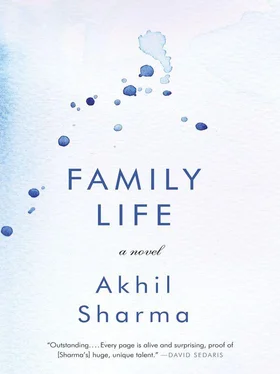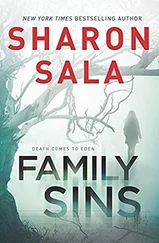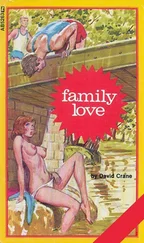At school, too, I wept. Sometimes when I felt the sobs starting, I looked down and held my breath and tried to think of other things — a television program, a book — but this wasn’t always enough. My teacher would send me out into the schoolyard so that I didn’t disturb the class.
The schoolyard had a swing set for little children and a slide. Otherwise, there was only a grassy field surrounded by a chain-link fence. I was embarrassed to be sent out. I felt foolish for behaving immaturely. I would walk along the fence and frequently I cried so hard that I lost my breath. When this happened, I became detached from myself. I walked and gasped and, as I did, I could feel my unhappiness walking beside me, waiting for my breath to return so that it could climb back inside me.
THE MOST IMPORTANT thing was to appeal to God. Each morning, my mother and I prayed before the altar. To me the altar was like a microphone — whatever we said in front of it would be broadcast directly to God. When I did my prayers, I traced an om, a crucifix, a Star of David onto the carpet by pressing against the pile. Beneath these I drew an S inside an upside-down triangle, for Superman. It seemed to me we should flatter anyone who could help.
One morning, I was doing my prayers before the altar when my mother came up to me. “What are you praying for?” she asked. She had her hat on, a thick gray knitted cap that had belonged to my uncle. The tracings on the carpet went against the weave and were darker than the surrounding nap. Pretending to examine them, I put my hand over the S . My mother did not mind the crucifix or the Star of David, but I knew she would be angry to catch me praying to a superhero, and in my nervousness I spoke the truth, “That God give me hundred percent on the math test.”
My mother was silent for a moment. “What if God says you can have the math grade but Birju would have to be sick a little while longer?”
I looked at the altar. Kali Ma danced on a postcard, sticking out her tongue and waving her many swords and daggers. I knew my mother wanted to be angry. I saw that she wanted to complain. I thought of Birju in his hospital bed. I thought of how proud he used to be of dressing properly, tucking in his shirt so that it was snug around his waist, lacing and unlacing his shoes until the loops were as even as dragonfly wings, and of how nowadays he got rashes on his penis from the urinary catheter. I thought of these things, and it seemed OK that my mother should complain before the altar, where God was likely to hear and would take pity.
“Are you going to tell me about Kusum mausiji again?”
“Why not? When I was in tenth standard and your aunt was sick, I walked seven times around the temple and said, ‘God, let me fail as long as you make Kusum better.’”
“If I failed the math test and told you that story, you’d slap me and say, ‘What does one have to do with the other?’”
My mother turned toward the altar. “What sort of sons did you give me? One you nearly drown and the other is this fool.”
I made my face earnest and looked at the altar so that God could see my sweetness. “I will fast today so that God puts some sense into me.”
“No,” my mother said. “You are a growing boy. Fasting is good for me. I gain blessings and lose weight at the same time.”
IN THE MORNINGS I prayed, and at night, when I was supposed to be sleeping but couldn’t, I spoke with God. One rainy night, the room was gray with light from the street and my mother was lying nearby, her breath whistling. I was on my strip of foam and I asked God whether he minded being prayed to only in need. “You think of your toe only when you stub it,” he said.
“Still, it’s better to pray just to pray.”
“It’s human nature. I don’t mind it.” God looked like Clark Kent. He was wearing a gray cardigan and slacks. He sat cross-legged at the foot of the mat. Originally, right after the accident when I had first started talking to him, God had looked like Krishna. But it had felt foolish to discuss brain damage with someone who was blue and was holding a flute and had a peacock feather in his hair.
“You’re not angry with me for touching the tree?”
“No, I’m flexible.”
There was a large oak tree on the way to school. It stood half on the sidewalk and half off it. Because the tree looked very old, I thought it might know God from when there were fewer things in the world. Usually as I passed it, I would touch the tree and bring my hand to my forehead the way I did when I had touched my grandfather’s feet.
“I respect you. The tree is just a way of showing respect to my elders.”
God laughed. “I am not too caught up in formalities.”
I became quiet. I was convinced that I had been marked as special by Birju’s accident. To me it appeared obvious that the beginnings of all heroes contained misfortune. Both God Krishna and Superman had been separated from their parents at birth. Batman, too, had been orphaned. God Ram had to spend fourteen years in the forest, and it was only then that he did things that made him famous. I waited until it would not seem improper to talk about myself.
“How famous will I be?” I finally asked.
“I can’t tell you the future,” God said.
“Why not?”
“Even if I told you something, I might change my mind.”
“But it would be harder for you to change your mind after you have said something will happen.”
God laughed again. “You’ll be so famous that fame will be a problem.”
I sighed and wiggled into the foam strip.
“I want Birju’s accident to lead to something.” Saying this felt noble.
“He won’t be forgotten.”
“I can’t just be famous, though. I need money, too. I need to take care of Mommy and Daddy.”
“First you grab the finger, and then you grab the wrist.”
“I’m just being practical.”
“Don’t worry. You can hardly imagine the life ahead.”
This last statement made me happy.
IT SEEMED OBVIOUS that God was more likely to help people who were good than those who were ordinary. This is why it felt very important that we behaved impeccably. My parents refused to do this, however.
My father was strange as always. Right after the accident, when he had first visited Birju, he had stood by the hospital bed, his face swollen and dark, his voice choked, and said, “Don’t think I don’t blame you. Don’t think I don’t know this is all your fault. What was in the pool? What was in there that you had to jump before anybody else got to it? Was there gold? Was there treasure?”
Since then, he had continued to say embarrassing things. Recently he had said that perhaps Birju had dived into the pool because of all the comic books he read, that Birju had thought he might gain superpowers by doing something like this.
“Shut up,” my mother had replied.
But my mother was not behaving well, either. She picked fights when she could have just been quiet.
Every Friday night my father arrived on a Greyhound bus. He left on Sunday evenings to go back to New York. All weekend my parents would fight.
One Saturday afternoon in October, a nurse’s aide, a large black woman in a white uniform, came into Birju’s room to replace his catheter. As she walked out, my father accompanied her to the door. “Thank you,” he said in the doorway.
When he came back to the hospital bed, my mother glared at him. “Don’t say, ‘Thank you, thank you.’ Don’t say, ‘You are so good. You are so kind.’ If you do, they will think you’re weak.” Recently, the hospital had told us that Birju needed to be moved, that now that his condition was stable, he needed to be put in a nursing home. The problem was that the insurance company was saying it wouldn’t pay for a nursing home and so over the last few weeks, my mother had been getting into screaming matches with the hospital administrators who wanted us to leave.
Читать дальше












